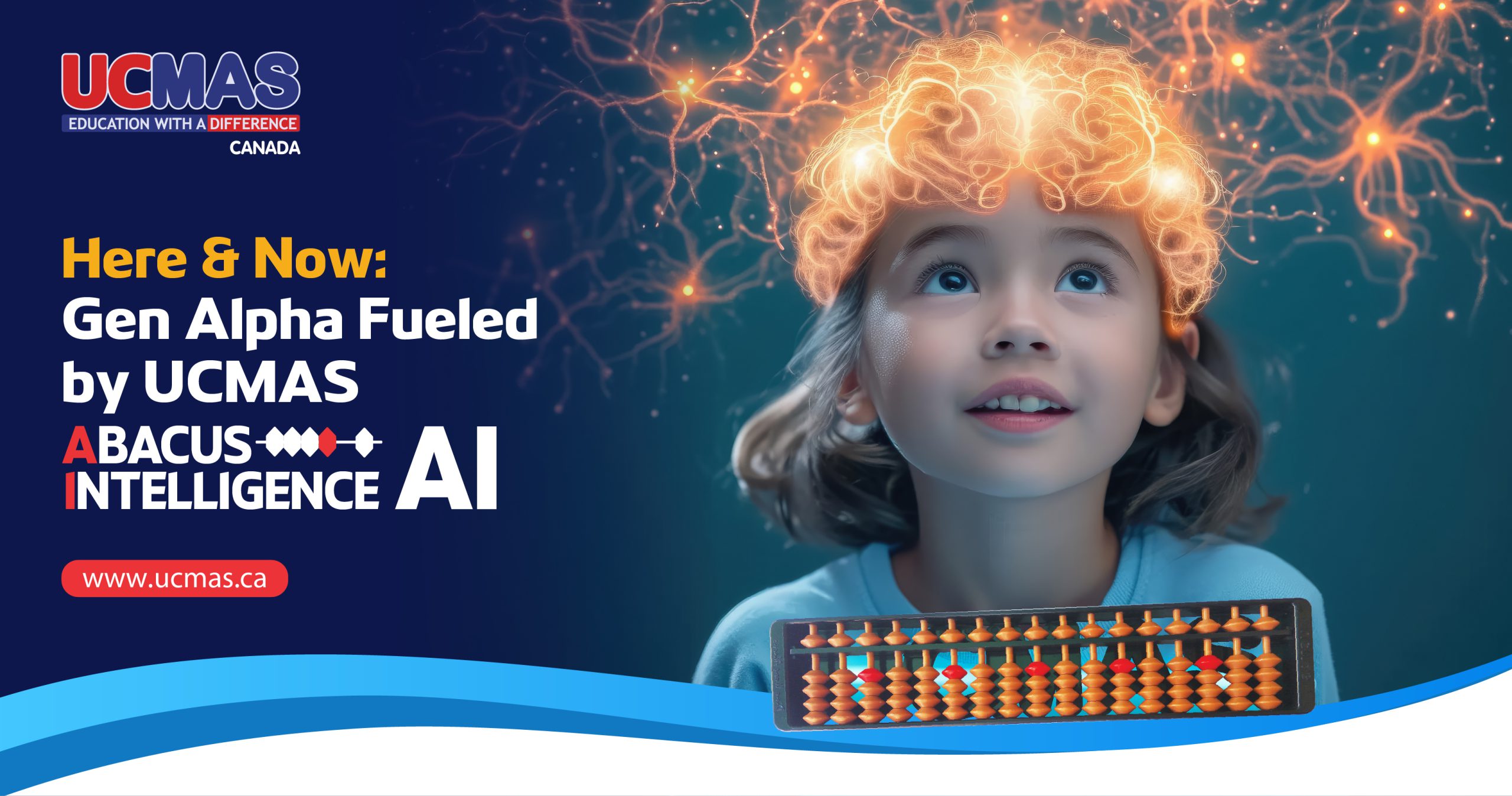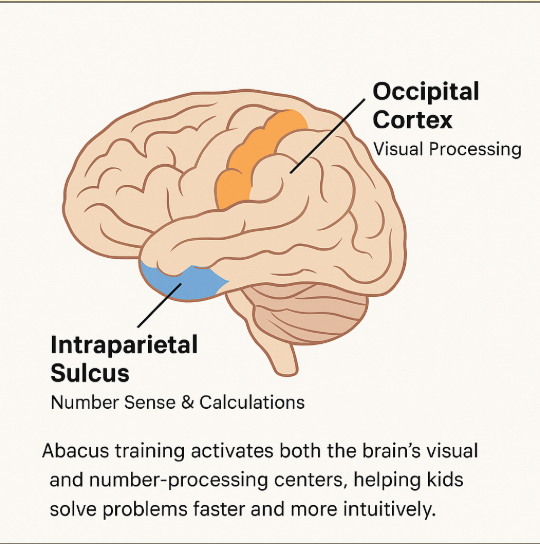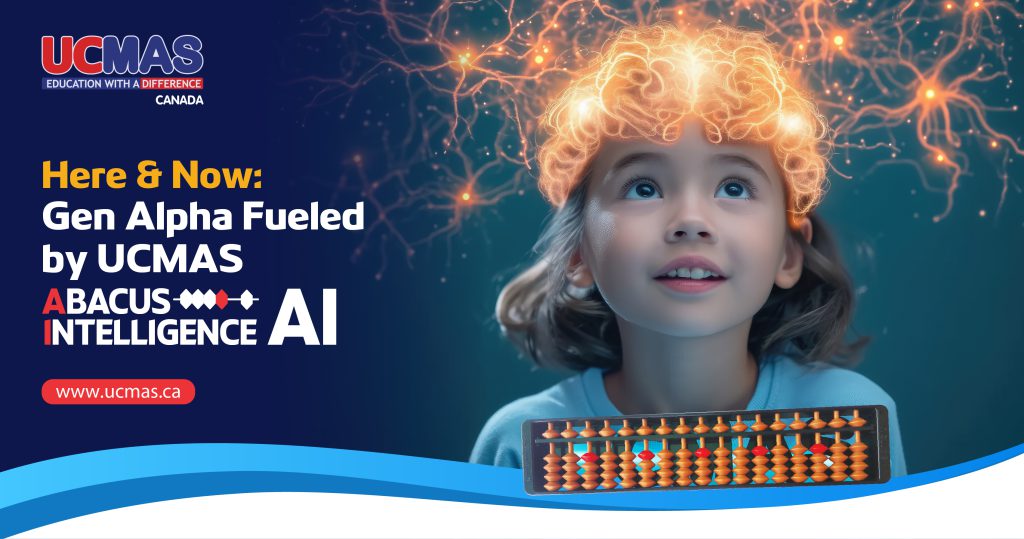
Imagine watching a child perform complex calculations like multiplying triple-digit numbers or solving equations, faster than a calculator, all while their fingers dance across an invisible tool in the air.
No, it’s not magic.
It’s abacus-based mental math, and science is finally catching up with what ancient educators already knew: this isn’t just arithmetic; it’s a full-brain workout.
As a parent, you might wonder why your child needs abacus training. In an era where children are being introduced to tablets even before they learn to hold a pencil, there is an urgent need to strike a balance between digital learning and deep cognitive development.
In this blog, we will tell you how this centuries-old wooden tool, called the Abacus, enhances a child’s brain function. We will also delve into the cognitive science behind Abacus Intelligence, examining how it enhances neural pathways, fosters mental agility, and may hold the key to cultivating truly balanced, high-performing minds in children.

What is Abacus Intelligence, Scientifically Speaking?
Abacus Intelligence is the measurable development of core cognitive abilities through abacus-based mental arithmetic training. It’s not just about speed math or number games. It’s a brain development system rooted in decades of scientific research, and it activates both the left and right hemispheres of the brain simultaneously.
Here’s a quick explainer by Megha Karia on how abacus training goes beyond math to activate both sides of the brain and sharpen memory, focus, and problem-solving.
“In a landmark study published in The Journal of Neuroscience, it was found that kids who practiced abacus math for a few months showed significant improvements in their memory and visual thinking skills. Their brain scans also revealed that the parts of the brain used for focus, memory, and picture-based thinking were much more active than in kids who didn’t learn the abacus.”
Simply put, this study suggests that children who are trained in the abacus tend to have a brain that works differently and in a more powerful way compared to children who don’t use the abacus.
How Abacus Training Rewires a Child’s Brain
To answer this question, we must first understand the concept of neuroplasticity. As we already know, our brains aren’t fixed. In fact, it grows and adapts with practice—a concept called neuroplasticity. When children learn to use an abacus, especially mentally, their brain builds new neural pathways and strengthen existing ones.
“A 2017 study published in Scientific Reports found that children who trained on the abacus had stronger connections between the parts of the brain that handle visual thinking and number sense, resulting in their brains working faster and more efficiently.”
This means abacus learners aren’t just memorizing steps. They’re building a more efficient, better-connected brain network.
The Rise of Visual-Spatial Thinking
One of the most powerful outcomes of abacus training is the shift from verbal to visual-spatial problem-solving.
“Research shows that kids who practiced abacus math for just 2 hours a week over 5 years scored much higher in both math tests and memory tasks compared to kids who didn’t – no matter how smart they were to begin with.”
Instead of counting or reciting numbers aloud, they can visualize the abacus in their mind’s eye and perform complex calculations mentally.
Abacus training is believed to activate the occipital cortex (visual processing) and the intraparietal sulcus (numerical magnitude), of a child’s brain, making them faster and more intuitive.

This brain shift enables kids to process multiple pieces of information simultaneously, something that traditional math teaching rarely promotes.
But, Why Does It Matter?
Visual-spatial thinking supports much more than math. It’s essential for:
- Reading comprehension
- Engineering and design
- Navigation and mapping
- Sports and strategy games
Abacus training doesn’t just improve how children solve math problems – it enhances how they think across disciplines.
Can Abacus Training Improve Memory?
Parents often report an unexpected bonus from abacus classes: a significant improvement in their child’s memory.
Abacus learners develop what’s often called eidetic memory—the ability to recall visual details with striking clarity. Why? Because solving math mentally using a visual image of the abacus repeatedly exercises and trains the brain’s memory muscles.
This memory boost extends far beyond math, helping kids retain spelling, grammar, facts, and even instructions with greater ease.
It Also Builds the Brain’s Executive Control Center
While the most visible result of abacus learning is fast math, one of the most important is improved executive function—the brain’s system for self-regulation, planning, and decision-making.
What Are Executive Functions?
These are the mental skills we use to:
- Focus attention
- Hold multiple steps in working memory
- Resist distractions
- Switch between tasks
- Stay organized and goal-oriented
In a 2023 study using functional near-infrared spectroscopy (fNIRS), children practicing mental abacus tasks showed heightened activation in the prefrontal cortex—particularly the frontal pole, associated with goal-setting and complex thinking.
Why This Matters More Than Ever in the Digital Age
We live in a world of touchscreens, auto-correct, and instant answers. While technology is a powerful learning tool, it often replaces effort with convenience. Kids can quickly lose the ability to:
- Concentrate for extended periods
- Solve problems without a calculator
- Retain information in memory
Abacus learning pushes them in the opposite direction. It trains the mind to stay focused, to think deeply, and to process problems actively—skills that are becoming rare but incredibly valuable in today’s attention-fragmented world.
The Real Outcome: Smarter, More Resilient Minds
Whether your goal is academic excellence, improved focus, or simply raising confident, capable learners, abacus training delivers science-backed results.
Let’s recap the proven cognitive benefits:
- Stronger memory
- Improved focus and attention span
- Faster, more intuitive math skills
- Better decision-making and planning
- Increased brain connectivity and visual intelligence
And it all starts with a simple tool and consistent practice.
Abacus is Not Just Math. It’s Mental Mastery.
Abacus intelligence is the brain’s answer to an increasingly distracted world. It develops not just faster calculators – but clearer thinkers, better learners, and more confident children.
Also, Abacus learning is not about rejecting modern tech; it’s about complementing it with cognitive tools that elevate how kids think, learn, and grow.
With UCMAS, you’re not just building a math whiz. You’re developing a future-ready thinker. So, the next time you see a child moving invisible beads in the air, don’t just see math in motion; see a brain getting sharper, stronger, and more powerful by the second.






